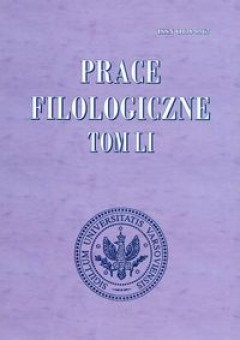Słowniki podhalańskie i ich twórcy
Lexicographic Works on Podhale (Polish Tatra Highlands) and Their Authors
Author(s): Joanna OkoniowaSubject(s): Language and Literature Studies
Published by: Wydział Polonistyki Uniwersytetu Warszawskiego
Keywords: dialektologia; leksykografia gwarowa; słowniki gwary podhalańskiej; dialectology; dialectal lexicography; lexicographic works on Podhale
Summary/Abstract: The article gives an overview of lexicographic works on Podhale (Polish Tatra Highlands). Its first part outlines the beginnings of lexicography and lexicology in Poland. The theory of composing dictionaries, namely lexicology, dates back to the 20th century, whereas practical work on dictionaries in Poland has been taking place continuously since the Middle Ages until today. Representation of the dialectal lexicon can be found already in the earliest lexicographic works, and since the 19th century folk language has become the object of scientific research. During the 20th century dialectology, ethnography and folklore study became scientific disciplines. Interest in Podhale goes back to 1802 when S. Staszic, during his stay in the South of Poland, including Podhale, took notes on some peculiarities, not only the geological ones, but also cultural and linguistic. Since then, two streams in the reception of the Podhale culture can be distinguished: scientific and artistic. At the beginning, observations about the peculiarity of the Podhale language were made on the margin of ethnographic and anthropological research. Almost until the end of the 19th century works of this kind were published. They contain, however, not only remarks on the language, but even small dictionaries. The 20th century witnessed the development of scientific dialectology, and Podhale was the object of research of many scholars. Among them, there were authors such as: L. Malinowski, R. Zawilin´ ski, M. Małecki, Z. Stieber, K. Nitsch. In the 60s of the 20th century, apart from amateur small dictionaries, many initiatives were undertaken to fill in the gaps of knowledge about Podhale. Collecting of the materials about Podhale is associated with the work of the Museum of the Tatra Mountains and with its director of many years, Juliusz Zborowski, who died in 1965 and bequeathed rich dictionary resources. They were borrowed by W. Paryski for the planned Wielki słownik góralski (Great Highlander Dictionary). Paryski adopted also Słownik góralskopodhalań ski (Highlander and Podhale dictionary) by Józef Waksmundzki and handwritten resources of Tadeusz Gąsienica-Giewont and Józef Zubek. He also included in his files almost all publications on Podhale published before 2000. Witold and Zofia Paryski died one by one in 2000 and 2003, barely at the beginning of the work on the dictionary. Meanwhile, in recent years further publications came out by such authors as H. Jost, Jan Gutt-Mostowy, J. K. Nowak, T. Bukowski-Grosek, J. Kobylińska, F. Fitak, S. A. Hodorowicz. The most comprehensive is Słownik gwary orawskiej from 2003 (Dictionary of the Orava dialect) by Józef Kąś, who is also planning to publish a dictionary of the Podhale dialect.
Journal: Prace Filologiczne
- Issue Year: 2006
- Issue No: 51
- Page Range: 261-270
- Page Count: 10
- Language: Polish

